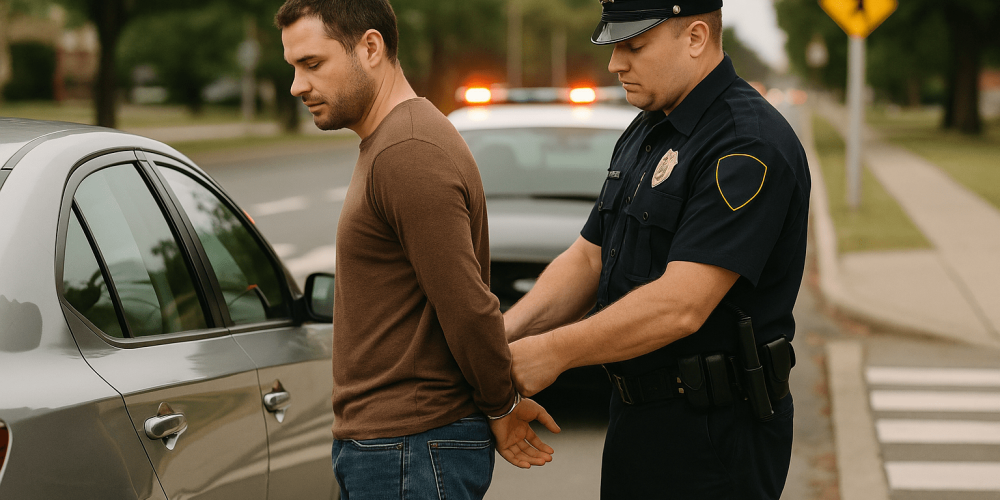Understanding a DUI Arrest
A DUI arrest can be a confusing and intimidating experience, especially if it’s your first time dealing with law enforcement. Knowing what happens during the arrest and how to respond can make a big difference in protecting your rights and minimizing long-term consequences. This guide breaks down the DUI arrest process, the legal penalties, and the steps you should take immediately after an arrest.
What Happens During a DUI Arrest?
A DUI arrest typically begins with a routine traffic stop or a DUI checkpoint. Officers are trained to observe signs of impairment such as swerving, slurred speech, or the smell of alcohol.
Step-by-Step Overview:
- Initial Stop: Law enforcement pulls you over or stops you at a checkpoint.
- Observation & Questions: The officer asks basic questions and observes your behavior.
- Field Sobriety Tests: You may be asked to perform tests like walking a straight line or standing on one leg.
- Breathalyzer or Chemical Test: A breath test is often administered to measure your Blood Alcohol Concentration (BAC).
- Arrest: If the officer has probable cause (e.g., failed tests or high BAC), you are placed under arrest.
- Booking: You’re taken to the station for fingerprinting, a mugshot, and further processing.
Understanding your rights is critical. You have the right to remain silent and request an attorney before answering questions. These actions can protect you later in court.
Legal Consequences After a DUI Arrest
The penalties following a DUI arrest can vary by state and depend on factors like prior offenses and BAC level. Even first-time offenders may face significant consequences.
Common Legal Penalties Include:
- Driver’s License Suspension: This may occur automatically under your state’s “implied consent” laws.
- Fines and Court Fees: You may be required to pay several hundred to thousands of dollars.
- Jail Time: Some states mandate minimum jail time, even for first offenses.
- Ignition Interlock Device: You might need to install this device to regain driving privileges.
- Mandatory Classes: Many courts order DUI education or alcohol treatment programs.
In some cases, drivers must carry special high-risk auto insurance. Learn more about SR-22 insurance requirements if this applies to your situation.
Attending DUI/DWI classes may also be necessary before your license can be reinstated.
How to Respond After Being Arrested for DUI
What you do in the hours and days following a DUI arrest can significantly affect the outcome of your case.
What You Should Do:
- Remain Silent: Politely decline to answer questions until you have legal counsel.
- Contact a Lawyer Immediately: A defense attorney can help you understand your options and begin building your case.
- Document Everything: Write down what happened, where, when, and who was involved.
- Review Legal Resources: Take time to learn about DUI laws in your state.
The sooner you act, the better your chances of reducing charges or minimizing penalties. You can find a DUI attorney near you to review your case or get a free consultation to explore next steps.
Avoid Mistakes After a DUI Arrest
Making informed choices can help you avoid making your situation worse.
- Never skip your court date or ignore legal paperwork
- Do not drive with a suspended license
- Avoid posting about your case on social media
- Follow all court orders and deadlines
- Seek help early to improve your defense options
Every action you take after a DUI arrest can influence your case’s outcome.
Get Help After a DUI Arrest Today
If you’ve recently experienced a DUI arrest, don’t face the legal process alone. A qualified defense attorney can help you navigate charges, fight for reduced penalties, or even challenge the arrest’s validity.
To protect your rights and your future:
- Get a free evaluation with a DUI defense expert
- Explore your legal options with expert representation and resources
- Find a DUI attorney who understands your state’s laws and court process
Frequently Asked Questions (FAQs)
1. What is the legal BAC limit for a DUI arrest?
In most states, the legal limit is 0.08% for adult drivers. Lower thresholds apply to commercial and underage drivers.
2. Can you refuse a breathalyzer during a DUI stop?
You can refuse, but doing so often results in automatic license suspension under implied consent laws.
3. Will I lose my license after a DUI arrest?
Most states impose an administrative license suspension after arrest, even before a court conviction.
4. Do I need a lawyer for my first DUI arrest?
Yes. Even first-time offenses can carry lasting consequences. Legal advice improves your chances of a better outcome.
5. How long does a DUI arrest stay on your record?
It varies by state. Some allow expungement after a waiting period, but others treat it as a permanent record.
Key Takeaways
- A DUI arrest begins with a traffic stop and often includes sobriety testing.
- Penalties include fines, jail time, and license suspension—even for first offenses.
- SR-22 insurance and DUI classes may be required after conviction.
- Knowing your rights can protect you during and after the arrest.
- Early legal help can make a major difference in your case outcome.








